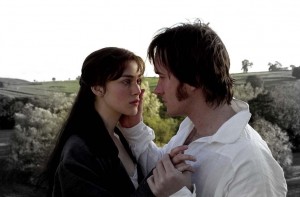It is axiomatic that an artist’s work will be admired and disdained for a single set of qualities. Some admire the breadth and passion of Beethoven while others find his stamina and pathos tedious. Some admire the precision and pacing of Kubrick’s films while others find them pretentious. Jane Austen is no exception; her longevity is like that of any other significant artist. The defenders and detractors never stop having their arguments about the worth of her work.
It may be worth revisiting Pride & Prejudice, which is two hundred years old this year, to consider what distinguishes her romances from contemporary romances. After all, Elizabeth Bennett is not the kind of character we can imagine will be convincingly portrayed by a Meg Ryan or a Kate Hudson, or even a Julia Roberts. Lizzy and Jane are not heroines who lend themselves to being championed by America’s sweethearts in just about any generation of film.
Arguably, Noah Berlatsky, writing for the Atlantic, has summed up the paradoxical appeal of Austen’s work: “She has to be one of the least romantic writers ever to write romance.”
Austen’s tales of romance may endure because she put so little stock in romance as we tend to define it. In an Austen novel, career advancement, real estate values, the size of an entailment, and the social and fiscal connections that come with marriage all matter. If that seems unappealing it is because we can’t conceive of a culture in which a marriage could be arranged to benefit clans rather than as the culmination of a quest for a “soulmate.” We also live in a culture which, in some sense, denies the inevitability of death. And so Austen’s tales of matrimony and negotiation don’t make sense to us because they are often, as Berlatsky put it, as “small as life.” Americans want life to be bigger and grander in every respect than a life could be in Jane Austen’s time.
But a title like Pride & Prejudice suggests that however domestic the tale, Austen’s themes are hardly small. Just as stories about war are rarely “just” about war, Austen’s tales of romance are not “just” stories of people who marry. The title tips us off to character flaws before we’ve even opened the book. Though Elizabeth and Darcy are not imbued with a social or symbolic significance as apocalyptic as Dostoevsky’s characters, they do represent ways of living life. That Austen is quotidian where Dostoevsky is apocalyptic, that Austen is mundane where Dostoevsky is grotesque hardly means she was not writing about ideas. Austen had an eye for the mundane details with which philosophies of life must contend on a daily basis. Dostoevsky wrote about the personal and social cataclysms that philosophies create when untempered by other ideals. But it is the dry domesticity of Austen’s narrative world and the long term decisions made within it that give her characters’ decisions weight. Irreversible life-altering decisions hinge on a person’s ability or inability to make the right decision after observing mundane details.
Login to read more
Sign in or create a free account to access Subscriber-only content.
